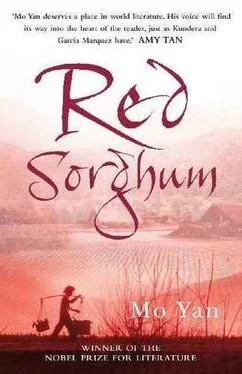Mo Yan - Red Sorghum
Здесь есть возможность читать онлайн «Mo Yan - Red Sorghum» весь текст электронной книги совершенно бесплатно (целиком полную версию без сокращений). В некоторых случаях можно слушать аудио, скачать через торрент в формате fb2 и присутствует краткое содержание. Год выпуска: 2003, Издательство: Arrow, Жанр: Современная проза, на английском языке. Описание произведения, (предисловие) а так же отзывы посетителей доступны на портале библиотеки ЛибКат.
- Название:Red Sorghum
- Автор:
- Издательство:Arrow
- Жанр:
- Год:2003
- ISBN:нет данных
- Рейтинг книги:3 / 5. Голосов: 1
-
Избранное:Добавить в избранное
- Отзывы:
-
Ваша оценка:
- 60
- 1
- 2
- 3
- 4
- 5
Red Sorghum: краткое содержание, описание и аннотация
Предлагаем к чтению аннотацию, описание, краткое содержание или предисловие (зависит от того, что написал сам автор книги «Red Sorghum»). Если вы не нашли необходимую информацию о книге — напишите в комментариях, мы постараемся отыскать её.
, a novel of family and myth, is told through a series of flashbacks that depict events of staggering horror set against a landscape of gemlike beauty, as the Chinese battle both Japanese invaders and each other in the turbulent war years of the 1930s.
A legend in China, where it won major literary awards inspired the Oscar-nominated film,
is a book in which fable and history collide to produce fiction that is entirely new and unforgettable.
Red Sorghum — читать онлайн бесплатно полную книгу (весь текст) целиком
Ниже представлен текст книги, разбитый по страницам. Система сохранения места последней прочитанной страницы, позволяет с удобством читать онлайн бесплатно книгу «Red Sorghum», без необходимости каждый раз заново искать на чём Вы остановились. Поставьте закладку, и сможете в любой момент перейти на страницу, на которой закончили чтение.
Интервал:
Закладка:
Father had eaten some of Old Geng’s sparrows when he was young. They were delicious. Three decades later, my older brother and I went into the sorghum field and engaged some crafty sparrows in a heated battle. Old Geng, who was already over seventy by then and lived alone as a pensioner, was one of our most revered villagers. Asked to speak at meetings to air grievances against the old order, he invariably stripped to the waist onstage to show his scars. ‘The Japs bayoneted me eighteen times,’ he’d say, ‘until you couldn’t see my skin for all the blood. But I didn’t die, and you know why? Because I was protected by a fox fairy. I don’t know how long I lay there, but when I opened my eyes all I could see was a bright-red light. The fox fairy was licking my wounds.’
In his home, Old Geng — Eighteen Stabs Geng — kept a fox-fairy memorial tablet, which some Red Guards decided to smash during the Cultural Revolution. They changed their minds and got out of there fast when they saw him kneel in front of the tablet wielding a cleaver.
Old Geng drew a bead on the red fox, knowing exactly which way it would run; but he was reluctant to shoot. He knew he could sell the beautiful, bushy pelt for a good price. If he was going to shoot, it had to be now. The fox had already enjoyed a full life, sneaking over nightly to steal a chicken. No matter how strong the villagers made their chicken coops, the fox always found a way inside and no matter how many traps they set, it always got away. That year the villagers’ chicken coops seemed built solely to store its food.
Old Geng had walked out of the village as the roosters were crowing for the third time and gone straight to a low embankment alongside the swamp in front of the village, where he waited for the chicken thief to show up. Dried-up marsh weeds stood waist-high in the swamp, where a thin sheet of nearly transparent ice, possibly thick enough to bear a man’s weight, covered the stagnant water that had accumulated during the autumn rains. Yellow tassels atop imprisoned reeds shivered in the freezing morning air, as powerful rays of light from far off in the eastern sky gradually illuminated the icy surface, which gave off a moist radiance, like the scales of a carp. Then the eastern sky turned bright, staining the ice and reeds the colour of mottled blood. Old Geng picked up the odour and saw a tight cluster of reeds part slowly like an undulating wave, then close up quickly. He stuck his nearly frozen index finger into his mouth and breathed on it, then wrapped it around the frost-covered trigger.
The fox bounded out of the clump of reeds and stood on the ice, turning it a bright red, as though it had gone up in flames. Congealed blood covered its pointy little snout; a chicken feather the colour of hemp was stuck in its whiskers. It walked with stately grace across the ice. Old Geng cried out, and it froze on the spot, squinting to get a good look at the embankment. Old Geng shivered, closed his eyes, and fired.
Like a little fireball, the fox rolled into the reeds. Old Geng, his shoulder numb from the recoil, stood up under a silvery sky, looking bigger and taller than usual. He knew the fox was hiding amid the reeds and staring at him with loathing. Something suspiciously like a guilty conscience began to stir in Old Geng. He thought back over the past year and the trust the fox had shown in him: it always knew he was hiding behind the embankment, yet it sauntered across the ice as though putting his conscience to the test. And Old Geng had always passed the test. But now he had betrayed this friendship, and he hung his head, gazing into the clump of reeds that had swallowed the fox, not even turning back to look when he heard the clatter of footsteps behind him.
Suddenly he felt a stabbing pain, and stumbled forward, twisting his body, dropping his shotgun to the ice. Something hot squirmed under his pants at the belt line. Running towards him were a dozen uniformed figures armed with rifles and glinting bayonets. Instinctively he yelled in fear, ‘Japan!’
The Japanese soldiers pounced on him and bayoneted him in the chest and abdomen. He screamed pitifully, like a fox howling for its mate. The blood from his wounds pitted the ice beneath him with its heat. He ripped off his tattered shirt with both hands. In his semiconscious state he saw the furry red fox emerge from the clump of reeds and circle round him once, then crouch down and gaze sympathetically. Its fur glowed brilliantly and its slightly slanted eyes shone like emeralds. After a while, Old Geng felt warm fur rubbing against his body, and he lay there waiting for the razor-sharp teeth to begin ripping him apart. If he were torn to shreds, he’d die with no complaints, for he knew that a man who betrays a trust is lower than an animal.
The fox began licking his wounds with its cold tongue.
Old Geng was adamant that the fox had repaid his betrayal by saving his life. Where else could you find another man who had sustained eighteen bayonet wounds yet lived to tell the tale? The fox’s tongue must have been coated with a miraculous substance since Old Geng’s wounds were instantly soothed, as though treated with peppermint oil — or so he said.
3
VILLAGERS WHO HAD gone to town to sell straw sandals announced upon their return: ‘Gaomi has been occupied by the Japanese. There’s a Rising Sun at the entrance!’
The panic-stricken villagers could only wait for the calamity they knew was coming. But not all of them suffered from racing hearts and crawling flesh: two among them went about their business totally unconcerned, never varying their routine. Who were they? One was Old Geng, the other a onetime musician who loved to sing Peking opera — Pocky Cheng.
‘What are you afraid of?’ Pocky Cheng asked everyone he met. ‘We’re still common folk, no matter who’s in charge. We don’t refuse to give the government its grain, and we always pay our taxes. We lie down when we’re told, and we kneel when they order us. So who’d dare punish us? Who, I ask you?’
His advice calmed many of the people, who began sleeping, eating, and working again. But it didn’t take long for the evil wind of Japanese savagery to blow their way: they fed human hearts to police dogs; they raped sixty-year-old women; they hung rows of human heads from electric poles in town. Even with the unflappable examples of Pocky Cheng and Old Geng, rumours of brutality were hard for the people to put aside, especially in their dreams.
Pocky Cheng walked around happy all the time. News that the Japanese were on their way to sack the village created a glut in dogshit in and around the village. Apparently the farmers who normally fought over it had grown lazy, for now it lay there waiting for him to come and claim it. He, too, walked out of the village as the roosters were crowing for the third time, running into Old Geng with his shotgun slung over his back. They greeted each other and parted ways. By the time the eastern sky had turned red, the pile of dogshit in Pocky Cheng’s basket was like a little mountain peak. He laid it down, stood on the southern edge of the village wall, and breathed in the cool, sweet morning air, until his throat itched. He cleared it loudly, then raised his voice to the rosy morning clouds and began to sing: ‘I am a thirsty grainstalk drinking up the morning dew —’
A shot rang out.
His battered, wingless felt hat sailed into the air. Tucking in his neck, he jumped into the ditch beneath the wall like a shot, bumping his head with a resounding thud against the frozen ground. Not sure if he was dead or alive, he tried moving his arms and legs. They were working, but barely. His crotch was all sticky. Fear raced through his heart. I’ve been hit, he thought. He sat up and stuck his hand down his pants. With his heart in his mouth, he pulled out his hand, expecting it to be all red. But it was covered with something yellow, and his nostrils twitched from the odour of rotten seedlings. He tried to rub the stuff off on the side of the ditch, but it stuck to his skin. He heard a shout from beyond the ditch: ‘Stand up!’
Читать дальшеИнтервал:
Закладка:
Похожие книги на «Red Sorghum»
Представляем Вашему вниманию похожие книги на «Red Sorghum» списком для выбора. Мы отобрали схожую по названию и смыслу литературу в надежде предоставить читателям больше вариантов отыскать новые, интересные, ещё непрочитанные произведения.
Обсуждение, отзывы о книге «Red Sorghum» и просто собственные мнения читателей. Оставьте ваши комментарии, напишите, что Вы думаете о произведении, его смысле или главных героях. Укажите что конкретно понравилось, а что нет, и почему Вы так считаете.












